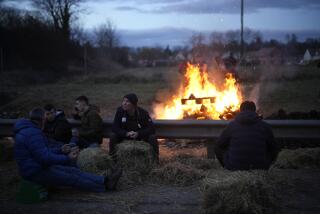Fuel-Price Protests Spread Across Europe
- Share via
LONDON — Taking a cue from French and Belgian protesters, British farmers took to the streets Monday to demand that their government lower fuel prices, and Irish and German truckers threatened to follow suit.
Blockades at British refineries caused shortages, and panic buying spread across the nation. But Prime Minister Tony Blair vowed not to cave in to pressure from protesters.
“We cannot and will not alter government policy on petrol through blockades and pickets--that is not the way to make policy in Britain,” Blair insisted.
His trade and industry secretary, Stephen Byers, meanwhile, called on the police to use whatever means necessary to end the blockades.
European gasoline and diesel prices have shot up as the price of crude oil has soared since the start of the year. But while European governments are pressing the Organization of the Petroleum Exporting Countries, or OPEC, to boost production and lower prices, European tractor, truck and taxi drivers are pushing their governments to lower taxes.
About 75% of the price of gasoline in Britain is taxes, pushing the cost to around $5 a gallon. In comparison, about 69% of the price in France goes to taxes and 24% in the United States.
Many stations in London ran out of gas Monday, as did hundreds of others throughout the country.
“We’ve had no delivery since Saturday, and the head office told us no delivery tomorrow, but maybe, maybe the day after,” said Rashpal Arora, a cashier at a Murco gas station in Chiswick.
His station ran out of unleaded gas about 11 a.m. Monday, but it was still selling diesel that night.
Farmers, who already have been hit hard by low crop prices, fishermen, truckers and taxi drivers complain that the high cost of fuel is hurting their livelihoods.
When French drivers launched their protests early this month, blockading refineries, gas stations and the English Channel tunnel crossing, many Britons regarded them with exasperation for resorting to what the Economist magazine termed “vile habits.”
But others admired their moxie, noting that attempts to organize even a daylong boycott of gas purchases in Britain earlier this year had failed. And when French Prime Minister Lionel Jospin gave in to protesters’ demands with a cut in fuel taxes, the British took note.
So did the Belgians, Germans, Irish and Spaniards.
In Belgium, truckers brought Brussels traffic to a standstill Monday for a second day.
German and Irish truckers vowed to take action this week unless their governments offered relief. Irish Prime Minister Bertie Ahern has agreed to meet with some of his nation’s truck drivers Wednesday to hear their demands.
As the wave of protests spread across Western Europe, France called for a meeting of European transport ministers Sept. 21 to discuss the possibility of harmonizing fuel prices and taxes. France currently holds the rotating European Union presidency.
Most of the blockades of France’s refineries and fuel depots were lifted Sunday after paralyzing the country for days.
OPEC ministers meeting in Vienna over the weekend agreed to raise oil output, but most economic analysts said that was unlikely to have any short-term effect on prices at the pump.
The booming world economy has driven up fuel consumption, and many developed countries find themselves with low reserves as winter approaches.
In Britain, consumers backed the demands of farmers and truckers, although their patience could wear thin as lines grow at gas pumps.
Robert Carhart, one of about 25 drivers waiting in line at a Total station in west London’s Acton neighborhood, blamed the government rather than OPEC for high prices.
“I am in sympathy. It’s the government’s fault. Crude oil is the same price the world over. It’s the taxation,” Carhart said.
Waiting behind him in a red Renault, Janet Radenkovic concurred: “I think what we are expected to pay is absolutely ridiculous.”
*
Janet Stobart of The Times’ London Bureau contributed to this report.
More to Read
Sign up for Essential California
The most important California stories and recommendations in your inbox every morning.
You may occasionally receive promotional content from the Los Angeles Times.













